Research
Students and obesity: Suzanne Johnson, Ph.D., chair and professor
in the department of medical humanities and social sciences, has received a
$2.2 million grant from the National Institutes of Health. With the
cooperation of Leon County Schools, she and her research team will monitor
children at 12 elementary schools that have a high percentage of
ethnic-minority students. The primary aim is to study the impact of BMI
(body mass index) screenings. BMI, calculated from weight and height
measurements, is a reliable indicator of whether children are overweight.
Each school offers three wellness programs: a free after-school exercise
program for children; expanded health assessments; and a wellness Web site
that promotes healthy eating and activity. Researchers will track the
children to document how much their health changes and how much their
parents take advantage of the wellness programs.
Read press release
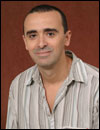 Stimulus spending: Mohamed Kabbaj, Ph.D., associate professor of
biomedical sciences, was one of the first U.S. scientists to benefit
directly from the federal economic-stimulus bill. He got $400,000 for a
two-year study tackling a core question related to depression: What are the
molecular mechanisms implicated in chronic stress-induced depression? The
grant came from the National Institutes of Health, using new funds provided
through the American Recovery and Reinvestment Act of 2009. Kabbaj’s
research could lead to more precise and effective treatments for people
suffering from depression. Read the
press release. Also, listen to the FSU
Headlines Radio interview. Stimulus spending: Mohamed Kabbaj, Ph.D., associate professor of
biomedical sciences, was one of the first U.S. scientists to benefit
directly from the federal economic-stimulus bill. He got $400,000 for a
two-year study tackling a core question related to depression: What are the
molecular mechanisms implicated in chronic stress-induced depression? The
grant came from the National Institutes of Health, using new funds provided
through the American Recovery and Reinvestment Act of 2009. Kabbaj’s
research could lead to more precise and effective treatments for people
suffering from depression. Read the
press release. Also, listen to the FSU
Headlines Radio interview.
TMH partnership: Florida State University and Tallahassee Memorial
HealthCare have signed an agreement to work as research partners on projects
with potential to directly affect health care in the Big Bend and across
Florida. The agreement will allow Tallahassee Memorial’s more than 500
affiliated physicians, many of whom already serve as College of Medicine
clinical faculty, to conduct laboratory research and clinical trials with
university researchers from the medical school as well as other colleges and
departments. This agreement is a model that could be extended to other
community hospitals where FSU medical students learn. That would provide a
foundation for the clinical research program with the potential to involve
more than 1,500 physicians and their 2 million patients. “Such a network
would give the FSU College of Medicine perhaps the most dynamic and
all-encompassing medical research program in the state,” said Myra Hurt,
senior associate dean for research and graduate programs.
Read the press release
Appointments
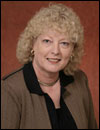 Myra Hurt, Ph.D., senior associate dean for research and graduate
programs, has been reappointed by Gov. Charlie Crist to a four-year term on
the state’s Biomedical Research Advisory Council. She’ll have a role in
determining how millions in annual research grant money from the James and
Esther King Biomedical Research Program and the Bankhead-Coley Cancer
Research Program is allocated among university and independent scientists in
the state. Increased competition for available federal research grants makes
state funding especially significant to Florida’s future, she said. “This
money," she said, "is especially important to young faculty scientists in
the state of Florida who are the future for research." Myra Hurt, Ph.D., senior associate dean for research and graduate
programs, has been reappointed by Gov. Charlie Crist to a four-year term on
the state’s Biomedical Research Advisory Council. She’ll have a role in
determining how millions in annual research grant money from the James and
Esther King Biomedical Research Program and the Bankhead-Coley Cancer
Research Program is allocated among university and independent scientists in
the state. Increased competition for available federal research grants makes
state funding especially significant to Florida’s future, she said. “This
money," she said, "is especially important to young faculty scientists in
the state of Florida who are the future for research."
Alma Littles, M.D., senior associate dean for medical education and
academic affairs, has been appointed to Florida’s Correctional Medical
Authority. The authority was created in 1986 to give independent advice to
the governor, Legislature and Department of Corrections on the conduct of
health care and management of costs consistent with quality care. It’s
required to employ health-care providers and other medical personnel to
conduct comprehensive evaluations of the health-care system at each
correctional system.
Publications
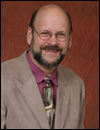 Ken Brummel-Smith, M.D., chair and professor in the department of
geriatrics, has published a new textbook, “Reichel’s Care of the Elderly.”
Edited by Christine Arenson, Jan Busby-Whitehead, James O’Brien, Mary
Palmer, William Reichel and Dr. Brummel-Smith, this 638-page textbook is a
standard in geriatrics, enjoying its 6th edition. It contains 60 chapters.
Five are written by current FSU College of Medicine faculty: Lisa
Granville, M.D., and Karen Myers, ARNP (sexuality), Jacqueline
Lloyd, M.D. (nutrition), Alice Pomidor, M.D. (driving),
Jeffrey Spike, M.D. (decision-making capacity) and Dr. Brummel-Smith
(rehabilitation). Ken Brummel-Smith, M.D., chair and professor in the department of
geriatrics, has published a new textbook, “Reichel’s Care of the Elderly.”
Edited by Christine Arenson, Jan Busby-Whitehead, James O’Brien, Mary
Palmer, William Reichel and Dr. Brummel-Smith, this 638-page textbook is a
standard in geriatrics, enjoying its 6th edition. It contains 60 chapters.
Five are written by current FSU College of Medicine faculty: Lisa
Granville, M.D., and Karen Myers, ARNP (sexuality), Jacqueline
Lloyd, M.D. (nutrition), Alice Pomidor, M.D. (driving),
Jeffrey Spike, M.D. (decision-making capacity) and Dr. Brummel-Smith
(rehabilitation).
Ken Brummel-Smith, M.D. and Mariana Dangiolo, M.D., assistant
professor of geriatrics, have an article in the February issue of
Clinics in Geriatric Medicine, titled “Assistive Technologies in the
Home.” That issue of Clinics is dedicated to the topic of home care.
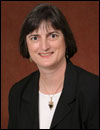 “Anatomy Class: Introduction to the First Patient,” an exercise developed by
Lisa Granville, M.D., associate chair in the department of
geriatrics, was posted in March in the Product Spotlight section of the
Portal of Geriatric
Online Education. Excerpt from the final paragraph: “This innovative
approach to the basic science curriculum is a simple, refreshing, and
exciting opportunity for medical students to begin honing their observation
skills. This also acts as a dry run at assessing their first geriatric
patient without the added element of social interaction. We hope that this
provides yet another method of approaching anatomy in the classroom, as it
expands clinical experience with older adults and provides an added
dimension to the dissection of a cadaver.” “Anatomy Class: Introduction to the First Patient,” an exercise developed by
Lisa Granville, M.D., associate chair in the department of
geriatrics, was posted in March in the Product Spotlight section of the
Portal of Geriatric
Online Education. Excerpt from the final paragraph: “This innovative
approach to the basic science curriculum is a simple, refreshing, and
exciting opportunity for medical students to begin honing their observation
skills. This also acts as a dry run at assessing their first geriatric
patient without the added element of social interaction. We hope that this
provides yet another method of approaching anatomy in the classroom, as it
expands clinical experience with older adults and provides an added
dimension to the dissection of a cadaver.”
Lisa Granville also co-wrote a chapter on urinary incontinence in
"Practical Gynecology: A Guide for the Primary Care Physician," 2nd edition.
Jeffrey Spike, Ph.D., associate professor of medical humanities
and social sciences, had a commentary on the presentation of professionalism
and ethical issues in the TV series “Scrubs” in the
American Journal of Bioethics, which was quoted and discussed in the
AMA News and on the AMA radio show.
Jeffrey Spike also had a fourth entry to MedEdPORTAL accepted, on
physicians’ attitudes toward complementary and alternative medicine (in the
case of Abraham Starchild Cherrix, a teenager with Hodgkin’s Disease who
refused chemotherapy).
Joseph Gabriel, Ph.D., assistant professor of medical humanities and
social sciences, published the article “A Thing Patented Is a Thing
Divulged: Francis E. Stewart, George S. Davis, and the Legitimization of
Patent Rights in Pharmaceutical Manufacturing, 1879-1911” in the April 2009
edition of the
Journal of the History of Medicine and Allied Sciences, 135-172.
Gareth Dutton, Ph.D., assistant professor of medical humanities and
social sciences, along with College of Medicine students Bridgette
Provost and Brandon Allen and colleagues from the TMH Diabetes
Center, co-wrote two manuscripts based on his investigation of physical
activity promotion among patients with diabetes. One paper, “Relationship
Between Self-Efficacy and Physical Activity Among Patients with Type 2
Diabetes,” will be published in an upcoming issue of the Journal of
Behavioral Medicine. The other, “A
tailored print-based physical activity intervention for patients with type 2
diabetes,” was published in a recent issue of Preventive Medicine.
Gareth Dutton also:
- Co-wrote with colleagues from the FSU College of Human Sciences “The
Freshman Weight Gain Phenomenon Revisited,” which was published in a
recent issue of Nutrition Reviews.
- Co-wrote with colleagues “Weight Maintenance Following a
Physician-Delivered Intervention for Obese, Low-Income Minority Women,”
which was published in a recent issue of the journal Obesity.
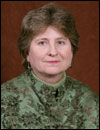 Barbara S. Shearer, MSLS, director of the Charlotte Edwards
Maguire Medical Library, Carolyn Klatt, MLIS, head of technical
services, and Suzanne P. Nagy, MSLS, head of Web services, co-wrote
an article that appeared in the April issue of the Journal of the Medical
Library Association. It was titled “Development of a new academic
digital library: a study of usage data of a core medical electronic journal
collection.” Barbara S. Shearer, MSLS, director of the Charlotte Edwards
Maguire Medical Library, Carolyn Klatt, MLIS, head of technical
services, and Suzanne P. Nagy, MSLS, head of Web services, co-wrote
an article that appeared in the April issue of the Journal of the Medical
Library Association. It was titled “Development of a new academic
digital library: a study of usage data of a core medical electronic journal
collection.”
Mohamed Kabbaj, Ph.D., associate professor of biomedical sciences,
was co-author along with several colleagues on a paper titled "Genome Wide
Promoter Analysis of Histone Modifications Induced by Cocaine" (2009). It is
scheduled for publication in Neuron soon.
Programs
 Lea Parsley, M.D., pediatric clerkship director, finished filming
an hour-long talk show in late April for the Florida Education Channel.
Called “Healthy Students: The Key to Optimal Learning,” it focuses on
childhood disorders that impact a student's learning and participation in
schools. “Educators are constantly pressured to optimize academic
achievement of students,” she said, “yet many of their students routinely
deal with a variety of health-related issues that may significantly hinder
the learning process and physical education.” The episode addresses symptoms
and indicators of potential or existing medical or health problems commonly
encountered in a school setting, such as autism, asthma, diabetes and eating
disorders. “We recruited a large panel of patients and parents that were
patients of our participating clerkship faculty for the FSU College of
Medicine,” Parsley said. “The series will be utilized by the Tuesday Teacher
Training Series for faculty development and educational credits for
schoolteachers, coaches, etc.” The Panhandle Area Educational Consortium was
responsible for organizing and producing the series in conjunction with
Parsley. This "Healthy Students" episode was scheduled to premiere April 28
and then air multiple times. A schedule of
broadcast
times is available. You also may watch it as a
Web-streamed video
from the coalition's FEC Web site. Lea Parsley, M.D., pediatric clerkship director, finished filming
an hour-long talk show in late April for the Florida Education Channel.
Called “Healthy Students: The Key to Optimal Learning,” it focuses on
childhood disorders that impact a student's learning and participation in
schools. “Educators are constantly pressured to optimize academic
achievement of students,” she said, “yet many of their students routinely
deal with a variety of health-related issues that may significantly hinder
the learning process and physical education.” The episode addresses symptoms
and indicators of potential or existing medical or health problems commonly
encountered in a school setting, such as autism, asthma, diabetes and eating
disorders. “We recruited a large panel of patients and parents that were
patients of our participating clerkship faculty for the FSU College of
Medicine,” Parsley said. “The series will be utilized by the Tuesday Teacher
Training Series for faculty development and educational credits for
schoolteachers, coaches, etc.” The Panhandle Area Educational Consortium was
responsible for organizing and producing the series in conjunction with
Parsley. This "Healthy Students" episode was scheduled to premiere April 28
and then air multiple times. A schedule of
broadcast
times is available. You also may watch it as a
Web-streamed video
from the coalition's FEC Web site.
Presentations
 Dennis Baker, Ph.D., associate dean for faculty development,
presented a workshop titled “The Use of Concept Mapping / Pattern Matching
for Planning and Evaluation in Medical Education” in April at the annual
conference of the Southern Group on Educational Affairs (SGEA) in New
Orleans. He presented it in collaboration with two colleague medical
educators from the West Virginia University School of Medicine and the West
Virginia University College of Education. Dennis Baker, Ph.D., associate dean for faculty development,
presented a workshop titled “The Use of Concept Mapping / Pattern Matching
for Planning and Evaluation in Medical Education” in April at the annual
conference of the Southern Group on Educational Affairs (SGEA) in New
Orleans. He presented it in collaboration with two colleague medical
educators from the West Virginia University School of Medicine and the West
Virginia University College of Education.
Eugene A. Trowers, M.D., MPH, FACP, professor of clinical sciences
and clerkship director in internal medicine, was invited to submit a
proposal or poster for April’s 2009 SGSA Annual Conference. He presented his
poster at the Southern Regional GSA/MAS/OSR Spring Meeting in Dallas.
Panel members included Sebastian Alston, M.D., associate dean for
curriculum and director of the Office of Medical Education; Dennis Baker,
Ph.D.; and Thesla Anderson, M.S., director of college and
pre-college outreach. The presentation title was “Responding to LCME IS-16:
A strategy for enhancing student diversity in a new college of medicine at
FSU.”
Joseph Gabriel, Ph.D., assistant professor of medical humanities and
social sciences, presented a paper titled “Consuming Subjects: Interpretive
Flexibility, Historicity, and Biopower in Addiction Research” at the
“Addiction and the Brain” Conference at Emory University in February. The
conference brought together leading scholars in the history of addiction and
neuroscientists to discuss interdisciplinary approaches to addiction.
Gareth Dutton, Ph.D., assistant professor of medical humanities and
social sciences, will present findings from his study on the expectations
and attitudes of primary-care physicians and overweight patients for
weight-loss counseling during primary-care visits at the upcoming Society of
Behavioral Medicine conference in Montreal. The titles of these
presentations are “Patients’ Preferences for Obesity-Related Terminology
Used by Their Physician” and “Weight Loss Goals of Patients in a Health
Maintenance Organization.”
Mary Gerend, Ph.D., assistant professor of medical humanities and
social sciences, gave a talk titled “Acceptance of the HPV Vaccine” in April
at the Florida Department of Health for the 2009 STD Awareness Month
Wednesday Wisdom Series.
Also in April, Mary Gerend presented a paper titled “I’m a guy: Do I
really need a “cervical cancer vaccine?” at the annual meeting of the
Society of Behavioral Medicine, in Montréal.
Lisa Granville, M.D., associate chair in the department of
geriatrics, made (or soon will make) the following CME presentations:
- FSU College of Medicine Faculty Development CME Conference, “What
students are learning in years 1 & 2,” Feb. 17 (Tallahassee regional
campus).
- FSU College of Medicine Faculty Development CME Conference,
“Progress in Geriatrics,” March 4 (Psychiatry Clerkship faculty,
Pensacola).
- METI conference presentation, “Blended Learning: Use of SPs with
Simulation,” with Dr. Steve Quintero and Deb Danforth, director of the
Clinical Learning Center, Tampa.
- SGEA conference presentation, “Don’t Kill Granny,” April 2, New
Orleans.
- ACP annual meeting presentation, “Update in Urology,” April 22,
Philadelphia.
- AGS annual meeting presentation, “Prostate Disease Clinical Update,”
May, Chicago.
- AANP annual meeting, “Incorporating SPs into a Nurse Practitioner
Curriculum,” with Deb Danforth, June 19, Nashville.
Honors
Joseph Gabriel, Ph.D., assistant professor of medical humanities
and social sciences, received the Jack D. Pressman-Burroughs Wellcome Award
from the American Association for the History of Medicine. He was honored
for his scholarly project “Gods and Monsters: Drug Addiction and the Origins
of Modern America.” Myra Hurt, Ph.D., senior associate dean for research and
graduate programs, said, “Joe Gabriel brings a wonderful perspective to our
young College of Medicine’s students and faculty.”
Read the press release. Listen to
the
FSU Headlines Radio interview.
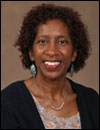 At least eight College of Medicine faculty members have been included in the
2009 edition of the Guide to America’s Top Family Doctors: Drs. Maggie
Blackburn, director of rural health; Hope Chema, assistant
professor in family medicine and rural health, Sarasota campus; Suzanne
Harrison, assistant professor and clerkship director in family medicine,
Tallahassee campus; Doug Meuser, clerkship director in family
medicine, Orlando campus; Jose Rodriguez, associate professor in
family medicine and rural health; Curt Stine, associate chair and
education director in family medicine; Daniel Van Durme, professor
and chair in family medicine and rural health; and Alma Littles,
M.D., senior associate dean for medical education and academic affairs. The
guide is published by Consumers’ Research Council of America. Selections are
based on a system that awards points for education, years in practice and
affiliations with professional associations.
Consumers’ Research web site. At least eight College of Medicine faculty members have been included in the
2009 edition of the Guide to America’s Top Family Doctors: Drs. Maggie
Blackburn, director of rural health; Hope Chema, assistant
professor in family medicine and rural health, Sarasota campus; Suzanne
Harrison, assistant professor and clerkship director in family medicine,
Tallahassee campus; Doug Meuser, clerkship director in family
medicine, Orlando campus; Jose Rodriguez, associate professor in
family medicine and rural health; Curt Stine, associate chair and
education director in family medicine; Daniel Van Durme, professor
and chair in family medicine and rural health; and Alma Littles,
M.D., senior associate dean for medical education and academic affairs. The
guide is published by Consumers’ Research Council of America. Selections are
based on a system that awards points for education, years in practice and
affiliations with professional associations.
Consumers’ Research web site.
Jeffrey Spike Ph.D., associate professor of medical humanities and
social sciences, has been nominated to be a member of the American Society
of Bioethics and Humanities (ASBH) Standing Committee on Clinical Ethics
Consultation Affairs (CECA) and its subcommittee on
credentialing/accreditation.
Alice Pomidor, M.D., associate professor of geriatrics, received the
Leading the Way award in March from the Alzheimer’s Project for exceptional
service to the aging and dementia communities of Tallahassee.
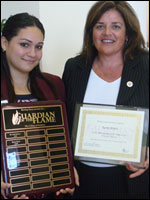 Karen Myers, ARNP, is not just an assistant professor of family
medicine and rural health but officially a Guardian of the Flame. This honor
is presented annually to someone in each FSU college by the students and
alumni of Burning Spear, a group dedicated to supporting outstanding members
of the Florida State community and strengthening campus traditions. Among
the comments made at the presentation: "Karen Myers selflessly serves the
students of Florida State University. She puts first- and second-year
medical students on the path to a successful career in the industry. Ms.
Myers also represents Florida State University as she serves as a Nurse
Practitioner at the Jefferson County Health Department and at Neighborhood
Health Services. Karen Myers represents everything we base our servant
leadership around." (She's pictured here with nursing student Sophia Khawly.) Karen Myers, ARNP, is not just an assistant professor of family
medicine and rural health but officially a Guardian of the Flame. This honor
is presented annually to someone in each FSU college by the students and
alumni of Burning Spear, a group dedicated to supporting outstanding members
of the Florida State community and strengthening campus traditions. Among
the comments made at the presentation: "Karen Myers selflessly serves the
students of Florida State University. She puts first- and second-year
medical students on the path to a successful career in the industry. Ms.
Myers also represents Florida State University as she serves as a Nurse
Practitioner at the Jefferson County Health Department and at Neighborhood
Health Services. Karen Myers represents everything we base our servant
leadership around." (She's pictured here with nursing student Sophia Khawly.)
More faculty news
Alma Littles, M.D., senior associate dean for medical education
and academic affairs:
- Co-moderated FAFP’s 102nd CME weekend.
- “Graduated” April 26 from the AAMC’s Group on Resident Affairs
Graduate Medical Education Leadership Development Course.
Sebastian Alston, M.D., associate dean for medical education,
attended a Harvard
Macy Institute program, "A Systems Approach to Assessment in Health
Science Education," March 7-13 at White Oak Plantation in Yulee. The program
addressed the many facets of assessment in medical education. This included
large-group lectures/discussions, daily discussions of assessment articles,
a group project and help with individual projects or issues. The overall
emphasis was the systems approach, and assessment issues from all levels of
medical education were covered. The conference was attended by 33
participants from 10 countries. The course directors were Elizabeth
Armstrong from Harvard, Lou Pangaro from USUHS and Connie Bowe of UC-Davis.
Alston's individual project concerns refining our competencies at FSU,
developing a process to map our course objectives and assessments to these
competencies, and transitioning to a continuous quality-improvement
model. White Oak, by the way, is a 7,400-acre plantation on the St. Marys
River, 30 miles north of Jacksonville. Endangered African animals including
rhinos and giraffes have been relocated there. The plantation contains a
conference center with lodging, a private golf course and many other meeting
and recreational opportunities.
Jeffrey Spike Ph.D., associate professor of medical humanities and
social sciences:
- Presented Grand Rounds on ethics in Pediatrics and Ethics in OB/GYN
at the FSU-sponsored residency programs at Sacred Heart Hospital in
Pensacola.
- Taught bioethics for seniors in the Osher Lifelong Learning
Institute (OLLI) at the Claude Pepper Center at FSU.
- Spearheaded the development of a new voluntary Community Activity
for the first-year medical students with the help of Lisa Granville,
M.D., in Geriatrics and financial support from the Reynolds Grant. It
enables the students to make a short video documentary of an elder in
the community in order to refine their listening and interviewing
skills, learn some of the history relevant to that age cohort (i.e.,
some American history from the ’40s and ’50s) and appreciate the
diversity in older populations.
- Invited a Grand Rounds speaker from the AMA to talk about the recent
apology issues by the AMA for its complicity with racist policies
starting with the Flexner Report and continuing right up until the
civil-rights legislation of the 1960s.
Gareth Dutton, Ph.D., recently collaborated with the Department of
Health Promotion at Capital Health Plan to develop and deliver a group-based
weight-loss program to CHP patients. This 16-week program, modeled after the
evidence-based and NIH-funded Diabetes Prevention Program, is designed to
promote weight loss, increase physical activity and reduce patients’ risk
for developing diabetes.
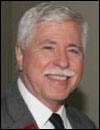 Wayne Munson is the College of Medicine’s new assistant dean for
development. His mission is to assist Dean Fogarty in raising private,
corporate and foundation financial resources in support of the college and
its students. Munson served with the U.S. Army more than 21 years; spent
five years as a major gift officer and marketing director for the
Association of Graduates at West Point; and spent another five years as head
of alumni relations and development at Embry-Riddle Aeronautical University.
Contact
Wayne Wayne Munson is the College of Medicine’s new assistant dean for
development. His mission is to assist Dean Fogarty in raising private,
corporate and foundation financial resources in support of the college and
its students. Munson served with the U.S. Army more than 21 years; spent
five years as a major gift officer and marketing director for the
Association of Graduates at West Point; and spent another five years as head
of alumni relations and development at Embry-Riddle Aeronautical University.
Contact
Wayne
|




 Stimulus spending: Mohamed Kabbaj, Ph.D., associate professor of
biomedical sciences, was one of the first U.S. scientists to benefit
directly from the federal economic-stimulus bill. He got $400,000 for a
two-year study tackling a core question related to depression: What are the
molecular mechanisms implicated in chronic stress-induced depression? The
grant came from the National Institutes of Health, using new funds provided
through the American Recovery and Reinvestment Act of 2009. Kabbaj’s
research could lead to more precise and effective treatments for people
suffering from depression.
Stimulus spending: Mohamed Kabbaj, Ph.D., associate professor of
biomedical sciences, was one of the first U.S. scientists to benefit
directly from the federal economic-stimulus bill. He got $400,000 for a
two-year study tackling a core question related to depression: What are the
molecular mechanisms implicated in chronic stress-induced depression? The
grant came from the National Institutes of Health, using new funds provided
through the American Recovery and Reinvestment Act of 2009. Kabbaj’s
research could lead to more precise and effective treatments for people
suffering from depression.  Myra Hurt, Ph.D., senior associate dean for research and graduate
programs, has been reappointed by Gov. Charlie Crist to a four-year term on
the state’s Biomedical Research Advisory Council. She’ll have a role in
determining how millions in annual research grant money from the James and
Esther King Biomedical Research Program and the Bankhead-Coley Cancer
Research Program is allocated among university and independent scientists in
the state. Increased competition for available federal research grants makes
state funding especially significant to Florida’s future, she said. “This
money," she said, "is especially important to young faculty scientists in
the state of Florida who are the future for research."
Myra Hurt, Ph.D., senior associate dean for research and graduate
programs, has been reappointed by Gov. Charlie Crist to a four-year term on
the state’s Biomedical Research Advisory Council. She’ll have a role in
determining how millions in annual research grant money from the James and
Esther King Biomedical Research Program and the Bankhead-Coley Cancer
Research Program is allocated among university and independent scientists in
the state. Increased competition for available federal research grants makes
state funding especially significant to Florida’s future, she said. “This
money," she said, "is especially important to young faculty scientists in
the state of Florida who are the future for research."  Ken Brummel-Smith, M.D., chair and professor in the department of
geriatrics, has published a new textbook, “Reichel’s Care of the Elderly.”
Edited by Christine Arenson, Jan Busby-Whitehead, James O’Brien, Mary
Palmer, William Reichel and Dr. Brummel-Smith, this 638-page textbook is a
standard in geriatrics, enjoying its 6th edition. It contains 60 chapters.
Five are written by current FSU College of Medicine faculty: Lisa
Granville, M.D., and Karen Myers, ARNP (sexuality), Jacqueline
Lloyd, M.D. (nutrition), Alice Pomidor, M.D. (driving),
Jeffrey Spike, M.D. (decision-making capacity) and Dr. Brummel-Smith
(rehabilitation).
Ken Brummel-Smith, M.D., chair and professor in the department of
geriatrics, has published a new textbook, “Reichel’s Care of the Elderly.”
Edited by Christine Arenson, Jan Busby-Whitehead, James O’Brien, Mary
Palmer, William Reichel and Dr. Brummel-Smith, this 638-page textbook is a
standard in geriatrics, enjoying its 6th edition. It contains 60 chapters.
Five are written by current FSU College of Medicine faculty: Lisa
Granville, M.D., and Karen Myers, ARNP (sexuality), Jacqueline
Lloyd, M.D. (nutrition), Alice Pomidor, M.D. (driving),
Jeffrey Spike, M.D. (decision-making capacity) and Dr. Brummel-Smith
(rehabilitation).  “Anatomy Class: Introduction to the First Patient,” an exercise developed by
Lisa Granville, M.D., associate chair in the department of
geriatrics, was posted in March in the Product Spotlight section of the
“Anatomy Class: Introduction to the First Patient,” an exercise developed by
Lisa Granville, M.D., associate chair in the department of
geriatrics, was posted in March in the Product Spotlight section of the
 Barbara S. Shearer, MSLS, director of the Charlotte Edwards
Maguire Medical Library, Carolyn Klatt, MLIS, head of technical
services, and Suzanne P. Nagy, MSLS, head of Web services, co-wrote
an article that appeared in the April issue of the Journal of the Medical
Library Association. It was titled “Development of a new academic
digital library: a study of usage data of a core medical electronic journal
collection.”
Barbara S. Shearer, MSLS, director of the Charlotte Edwards
Maguire Medical Library, Carolyn Klatt, MLIS, head of technical
services, and Suzanne P. Nagy, MSLS, head of Web services, co-wrote
an article that appeared in the April issue of the Journal of the Medical
Library Association. It was titled “Development of a new academic
digital library: a study of usage data of a core medical electronic journal
collection.”  Lea Parsley, M.D., pediatric clerkship director, finished filming
an hour-long talk show in late April for the Florida Education Channel.
Called “Healthy Students: The Key to Optimal Learning,” it focuses on
childhood disorders that impact a student's learning and participation in
schools. “Educators are constantly pressured to optimize academic
achievement of students,” she said, “yet many of their students routinely
deal with a variety of health-related issues that may significantly hinder
the learning process and physical education.” The episode addresses symptoms
and indicators of potential or existing medical or health problems commonly
encountered in a school setting, such as autism, asthma, diabetes and eating
disorders. “We recruited a large panel of patients and parents that were
patients of our participating clerkship faculty for the FSU College of
Medicine,” Parsley said. “The series will be utilized by the Tuesday Teacher
Training Series for faculty development and educational credits for
schoolteachers, coaches, etc.” The Panhandle Area Educational Consortium was
responsible for organizing and producing the series in conjunction with
Parsley. This "Healthy Students" episode was scheduled to premiere April 28
and then air multiple times. A schedule of
Lea Parsley, M.D., pediatric clerkship director, finished filming
an hour-long talk show in late April for the Florida Education Channel.
Called “Healthy Students: The Key to Optimal Learning,” it focuses on
childhood disorders that impact a student's learning and participation in
schools. “Educators are constantly pressured to optimize academic
achievement of students,” she said, “yet many of their students routinely
deal with a variety of health-related issues that may significantly hinder
the learning process and physical education.” The episode addresses symptoms
and indicators of potential or existing medical or health problems commonly
encountered in a school setting, such as autism, asthma, diabetes and eating
disorders. “We recruited a large panel of patients and parents that were
patients of our participating clerkship faculty for the FSU College of
Medicine,” Parsley said. “The series will be utilized by the Tuesday Teacher
Training Series for faculty development and educational credits for
schoolteachers, coaches, etc.” The Panhandle Area Educational Consortium was
responsible for organizing and producing the series in conjunction with
Parsley. This "Healthy Students" episode was scheduled to premiere April 28
and then air multiple times. A schedule of
 Dennis Baker, Ph.D., associate dean for faculty development,
presented a workshop titled “The Use of Concept Mapping / Pattern Matching
for Planning and Evaluation in Medical Education” in April at the annual
conference of the Southern Group on Educational Affairs (SGEA) in New
Orleans. He presented it in collaboration with two colleague medical
educators from the West Virginia University School of Medicine and the West
Virginia University College of Education.
Dennis Baker, Ph.D., associate dean for faculty development,
presented a workshop titled “The Use of Concept Mapping / Pattern Matching
for Planning and Evaluation in Medical Education” in April at the annual
conference of the Southern Group on Educational Affairs (SGEA) in New
Orleans. He presented it in collaboration with two colleague medical
educators from the West Virginia University School of Medicine and the West
Virginia University College of Education. At least eight College of Medicine faculty members have been included in the
2009 edition of the Guide to America’s Top Family Doctors: Drs. Maggie
Blackburn, director of rural health; Hope Chema, assistant
professor in family medicine and rural health, Sarasota campus; Suzanne
Harrison, assistant professor and clerkship director in family medicine,
Tallahassee campus; Doug Meuser, clerkship director in family
medicine, Orlando campus; Jose Rodriguez, associate professor in
family medicine and rural health; Curt Stine, associate chair and
education director in family medicine; Daniel Van Durme, professor
and chair in family medicine and rural health; and Alma Littles,
M.D., senior associate dean for medical education and academic affairs. The
guide is published by Consumers’ Research Council of America. Selections are
based on a system that awards points for education, years in practice and
affiliations with professional associations.
At least eight College of Medicine faculty members have been included in the
2009 edition of the Guide to America’s Top Family Doctors: Drs. Maggie
Blackburn, director of rural health; Hope Chema, assistant
professor in family medicine and rural health, Sarasota campus; Suzanne
Harrison, assistant professor and clerkship director in family medicine,
Tallahassee campus; Doug Meuser, clerkship director in family
medicine, Orlando campus; Jose Rodriguez, associate professor in
family medicine and rural health; Curt Stine, associate chair and
education director in family medicine; Daniel Van Durme, professor
and chair in family medicine and rural health; and Alma Littles,
M.D., senior associate dean for medical education and academic affairs. The
guide is published by Consumers’ Research Council of America. Selections are
based on a system that awards points for education, years in practice and
affiliations with professional associations.
 Karen Myers, ARNP, is not just an assistant professor of family
medicine and rural health but officially a Guardian of the Flame. This honor
is presented annually to someone in each FSU college by the students and
alumni of Burning Spear, a group dedicated to supporting outstanding members
of the Florida State community and strengthening campus traditions. Among
the comments made at the presentation: "Karen Myers selflessly serves the
students of Florida State University. She puts first- and second-year
medical students on the path to a successful career in the industry. Ms.
Myers also represents Florida State University as she serves as a Nurse
Practitioner at the Jefferson County Health Department and at Neighborhood
Health Services. Karen Myers represents everything we base our servant
leadership around." (She's pictured here with nursing student Sophia Khawly.)
Karen Myers, ARNP, is not just an assistant professor of family
medicine and rural health but officially a Guardian of the Flame. This honor
is presented annually to someone in each FSU college by the students and
alumni of Burning Spear, a group dedicated to supporting outstanding members
of the Florida State community and strengthening campus traditions. Among
the comments made at the presentation: "Karen Myers selflessly serves the
students of Florida State University. She puts first- and second-year
medical students on the path to a successful career in the industry. Ms.
Myers also represents Florida State University as she serves as a Nurse
Practitioner at the Jefferson County Health Department and at Neighborhood
Health Services. Karen Myers represents everything we base our servant
leadership around." (She's pictured here with nursing student Sophia Khawly.) Wayne Munson is the College of Medicine’s new assistant dean for
development. His mission is to assist Dean Fogarty in raising private,
corporate and foundation financial resources in support of the college and
its students. Munson served with the U.S. Army more than 21 years; spent
five years as a major gift officer and marketing director for the
Association of Graduates at West Point; and spent another five years as head
of alumni relations and development at Embry-Riddle Aeronautical University.
Wayne Munson is the College of Medicine’s new assistant dean for
development. His mission is to assist Dean Fogarty in raising private,
corporate and foundation financial resources in support of the college and
its students. Munson served with the U.S. Army more than 21 years; spent
five years as a major gift officer and marketing director for the
Association of Graduates at West Point; and spent another five years as head
of alumni relations and development at Embry-Riddle Aeronautical University.
